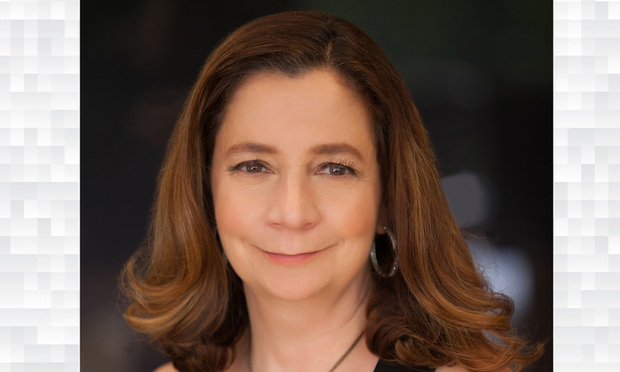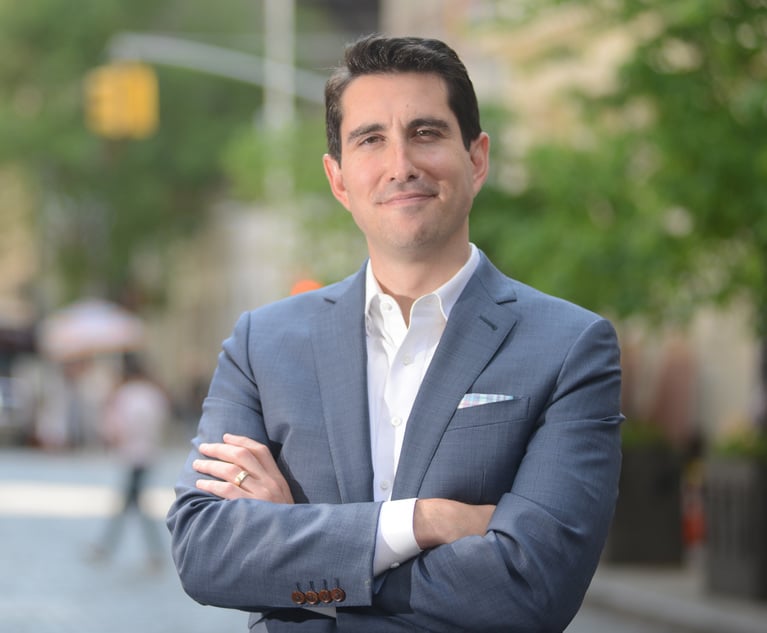Uber In-House Lawyer Gets Grilling From Judge Over Inflammatory Letter
"Maybe you're in trouble," Judge William Alsup told Uber's Angela Padilla. "This document should have been produced."
November 29, 2017 at 05:01 PM
22 minute read
 Angela Padilla of Uber. Courtesy Photo.
Angela Padilla of Uber. Courtesy Photo. Uber Technologies Inc. deputy general counsel Angela Padilla appeared before a federal judge in San Francisco Wednesday morning as part of a pretrial hearing in the legal showdown that pits the ride-hailing company against Google's autonomous car unit, Waymo.
Padilla was called to testify after the court revealed that an inflammatory letter had been written to the deputy GC by a former Uber employee, alleging that Uber used secretive techniques, such as encryption, to conceal intelligence it had gathered on other companies, and to keep this information out of reach during litigation.
U.S. District Judge William Alsup of the of the Northern District of California gave Padilla a grilling, criticizing her for failing to produce the letter in the ongoing trade secrets battle with Waymo.
The unusual decision to ask an in-house counsel to appear before a judge came following the uncovering of the letter from former Uber employee Richard Jacobs, which said that Uber used disappearing and encrypted messages as well as non-Uber laptops to keep information off of the company's servers. It also said there was an internal unit at the company solely dedicated to “stealing trade secrets, code base and competitive intelligence from competitors.”
These revelations, which came as part of a separate but related trade secret theft investigation by the local U.S. Attorney's office, contributed to Alsup's choice to delay trial—previously slated to begin on Dec. 4.
In her testimony Wednesday, Padilla called Jacobs an extortionist, and said the letter was “fantastical” and had “little merit.”
Padilla testified that upon receiving the May letter via email from Jacobs, she passed it along to Joe Spiegler and Sidney Majalya, lawyers in Uber's compliance department, at a meeting where Uber's then-CLO Salle Yoo was present. Padilla stated she was told by Spiegler and Majalya not to show the letter to anyone else while the compliance department worked with outside counsel from Wilmer Cutler Pickering Hale and Dorr to determine the veracity of Jacobs' numerous allegations, saying it would obstruct the investigation. Padilla said she did not think to pass the document to any of the other in-house lawyers at Uber working on the Waymo case or to outside counsel on either side.
“When the letter first came in, that never occurred to me,” she said. “Because we receive a lot of letters from unhappy employees and a lot of them make wild crazy allegations that are never substantiated. We wanted to get Wilmer Hale on board to look into it and see whether any of it was true.”
The internal investigation ended earlier this month, though findings are still confidential and Padilla said she has not yet seen them. Alsup questioned Padilla as to why the letter was shared with then-CEO Travis Kalanick, who was not involved in the internal investigation, but not lawyers involved in the Waymo case.
And Alsup wanted other answers from Padilla too.
When the Uber lawyer stated she had been transparent with the letter and its allegations by voluntarily submitting it to the Northern District of California U.S. Attorney's office later on, in June, following the completion of Jacobs' exit deal, Alsup noted that its extremely rare for him to have received an evidentiary document from the U.S. attorney. He said it's the first time he's seen it happen in this court.
“Maybe you're in trouble,” Alsup told Padilla. “This document should have been produced … You wanted this case to go to trial so that they didn't have the document, then it turns out the U.S. attorney did an unusual thing. Maybe the guy [Jacobs] is a disgruntled employee but that's not your decision to make, that's the jury's.”
Padilla justified withholding the letter from lawyers working on the case because she said she believed it would be found by the Waymo team during their search of Uber's servers, though Padilla was not one of those targeted in the search. Waymo's lawyers stated they did not find the email during discovery.
“The letter sat in my email system and the email system of many people in the company,” Padilla said. “All of which I thought would be searched, so I thought it would be picked up and reviewed as part of the discovery course.”
The head of Waymo's legal team, Charles Verhoeven of Quinn Emanuel Urquhart & Sullivan, then questioned why Padilla's company gave Jacobs a $4.5 million exit deal from the company and asked him to consult with Wilmer Hale lawyers on improving Uber for a year post-termination if he was nothing more than a lying extortionist. Padilla testified that Jacobs was the only such “extortionist” to be kept on as a consultant.
She said that the agreement with Jacobs was used to keep the matter out of court, where the costs of an outside legal team and workplace disruption would have cost more than $4.5 million, on top of potentially unsubstantiated allegations harming Uber's public reputation. The consulting Jacobs did was mostly related to security, Padilla stated.
But Alsup wasn't convinced.
“Here's the way it looks,” he said. “You said it was a fantastic BS letter with no merit and yet you paid $4.5 million. To someone like me and people out there, mortals, that's a lot of money, that's a lot of money. And people don't pay that kind of money for BS and you certainly don't hire them as consultant if you think everything they've got to contribute is BS. On the surface it looks like you covered this up.”
The trial's new start date is still to be announced. It's possible that more of Uber's in-house lawyers and employees will be called into testify in light of Padilla's statements.
 Angela Padilla of Uber. Courtesy Photo.
Angela Padilla of Uber. Courtesy Photo. Uber Technologies Inc. deputy general counsel Angela Padilla appeared before a federal judge in San Francisco Wednesday morning as part of a pretrial hearing in the legal showdown that pits the ride-hailing company against
Padilla was called to testify after the court revealed that an inflammatory letter had been written to the deputy GC by a former Uber employee, alleging that Uber used secretive techniques, such as encryption, to conceal intelligence it had gathered on other companies, and to keep this information out of reach during litigation.
U.S. District Judge
The unusual decision to ask an in-house counsel to appear before a judge came following the uncovering of the letter from former Uber employee Richard Jacobs, which said that Uber used disappearing and encrypted messages as well as non-Uber laptops to keep information off of the company's servers. It also said there was an internal unit at the company solely dedicated to “stealing trade secrets, code base and competitive intelligence from competitors.”
These revelations, which came as part of a separate but related trade secret theft investigation by the local U.S. Attorney's office, contributed to Alsup's choice to delay trial—previously slated to begin on Dec. 4.
In her testimony Wednesday, Padilla called Jacobs an extortionist, and said the letter was “fantastical” and had “little merit.”
Padilla testified that upon receiving the May letter via email from Jacobs, she passed it along to Joe Spiegler and Sidney Majalya, lawyers in Uber's compliance department, at a meeting where Uber's then-CLO Salle Yoo was present. Padilla stated she was told by Spiegler and Majalya not to show the letter to anyone else while the compliance department worked with outside counsel from
“When the letter first came in, that never occurred to me,” she said. “Because we receive a lot of letters from unhappy employees and a lot of them make wild crazy allegations that are never substantiated. We wanted to get
The internal investigation ended earlier this month, though findings are still confidential and Padilla said she has not yet seen them. Alsup questioned Padilla as to why the letter was shared with then-CEO Travis Kalanick, who was not involved in the internal investigation, but not lawyers involved in the Waymo case.
And Alsup wanted other answers from Padilla too.
When the Uber lawyer stated she had been transparent with the letter and its allegations by voluntarily submitting it to the Northern District of California U.S. Attorney's office later on, in June, following the completion of Jacobs' exit deal, Alsup noted that its extremely rare for him to have received an evidentiary document from the U.S. attorney. He said it's the first time he's seen it happen in this court.
“Maybe you're in trouble,” Alsup told Padilla. “This document should have been produced … You wanted this case to go to trial so that they didn't have the document, then it turns out the U.S. attorney did an unusual thing. Maybe the guy [Jacobs] is a disgruntled employee but that's not your decision to make, that's the jury's.”
Padilla justified withholding the letter from lawyers working on the case because she said she believed it would be found by the Waymo team during their search of Uber's servers, though Padilla was not one of those targeted in the search. Waymo's lawyers stated they did not find the email during discovery.
“The letter sat in my email system and the email system of many people in the company,” Padilla said. “All of which I thought would be searched, so I thought it would be picked up and reviewed as part of the discovery course.”
The head of Waymo's legal team, Charles Verhoeven of
She said that the agreement with Jacobs was used to keep the matter out of court, where the costs of an outside legal team and workplace disruption would have cost more than $4.5 million, on top of potentially unsubstantiated allegations harming Uber's public reputation. The consulting Jacobs did was mostly related to security, Padilla stated.
But Alsup wasn't convinced.
“Here's the way it looks,” he said. “You said it was a fantastic BS letter with no merit and yet you paid $4.5 million. To someone like me and people out there, mortals, that's a lot of money, that's a lot of money. And people don't pay that kind of money for BS and you certainly don't hire them as consultant if you think everything they've got to contribute is BS. On the surface it looks like you covered this up.”
The trial's new start date is still to be announced. It's possible that more of Uber's in-house lawyers and employees will be called into testify in light of Padilla's statements.
This content has been archived. It is available through our partners, LexisNexis® and Bloomberg Law.
To view this content, please continue to their sites.
Not a Lexis Subscriber?
Subscribe Now
Not a Bloomberg Law Subscriber?
Subscribe Now
NOT FOR REPRINT
© 2025 ALM Global, LLC, All Rights Reserved. Request academic re-use from www.copyright.com. All other uses, submit a request to [email protected]. For more information visit Asset & Logo Licensing.
You Might Like
View All
Kraken’s Chief Legal Officer Exits, Eyes Role in Trump Administration
3 minute read

Collectible Maker Funko Wins Motion to Dismiss Securities Class Action

How Tony West Used Transparency to Reform Uber's Toxic Culture
Trending Stories
Who Got The Work
J. Brugh Lower of Gibbons has entered an appearance for industrial equipment supplier Devco Corporation in a pending trademark infringement lawsuit. The suit, accusing the defendant of selling knock-off Graco products, was filed Dec. 18 in New Jersey District Court by Rivkin Radler on behalf of Graco Inc. and Graco Minnesota. The case, assigned to U.S. District Judge Zahid N. Quraishi, is 3:24-cv-11294, Graco Inc. et al v. Devco Corporation.
Who Got The Work
Rebecca Maller-Stein and Kent A. Yalowitz of Arnold & Porter Kaye Scholer have entered their appearances for Hanaco Venture Capital and its executives, Lior Prosor and David Frankel, in a pending securities lawsuit. The action, filed on Dec. 24 in New York Southern District Court by Zell, Aron & Co. on behalf of Goldeneye Advisors, accuses the defendants of negligently and fraudulently managing the plaintiff's $1 million investment. The case, assigned to U.S. District Judge Vernon S. Broderick, is 1:24-cv-09918, Goldeneye Advisors, LLC v. Hanaco Venture Capital, Ltd. et al.
Who Got The Work
Attorneys from A&O Shearman has stepped in as defense counsel for Toronto-Dominion Bank and other defendants in a pending securities class action. The suit, filed Dec. 11 in New York Southern District Court by Bleichmar Fonti & Auld, accuses the defendants of concealing the bank's 'pervasive' deficiencies in regards to its compliance with the Bank Secrecy Act and the quality of its anti-money laundering controls. The case, assigned to U.S. District Judge Arun Subramanian, is 1:24-cv-09445, Gonzalez v. The Toronto-Dominion Bank et al.
Who Got The Work
Crown Castle International, a Pennsylvania company providing shared communications infrastructure, has turned to Luke D. Wolf of Gordon Rees Scully Mansukhani to fend off a pending breach-of-contract lawsuit. The court action, filed Nov. 25 in Michigan Eastern District Court by Hooper Hathaway PC on behalf of The Town Residences LLC, accuses Crown Castle of failing to transfer approximately $30,000 in utility payments from T-Mobile in breach of a roof-top lease and assignment agreement. The case, assigned to U.S. District Judge Susan K. Declercq, is 2:24-cv-13131, The Town Residences LLC v. T-Mobile US, Inc. et al.
Who Got The Work
Wilfred P. Coronato and Daniel M. Schwartz of McCarter & English have stepped in as defense counsel to Electrolux Home Products Inc. in a pending product liability lawsuit. The court action, filed Nov. 26 in New York Eastern District Court by Poulos Lopiccolo PC and Nagel Rice LLP on behalf of David Stern, alleges that the defendant's refrigerators’ drawers and shelving repeatedly break and fall apart within months after purchase. The case, assigned to U.S. District Judge Joan M. Azrack, is 2:24-cv-08204, Stern v. Electrolux Home Products, Inc.
Featured Firms
Law Offices of Gary Martin Hays & Associates, P.C.
(470) 294-1674
Law Offices of Mark E. Salomone
(857) 444-6468
Smith & Hassler
(713) 739-1250






